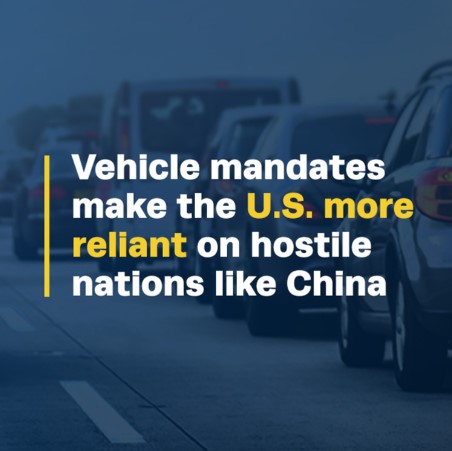Memo to Congress: Defend Consumer Choice – Repeal EPA’s New Tailpipe Emissions Rule
Amanda Eversole
Posted March 20, 2024
Breaking News: EPA’s finalized tailpipe emissions rule was released today – a rule that amounts to a de facto ban on new sales of gasoline-powered vehicles and traditional hybrids from model year 2027 to 2032.
Digging into the Details: In the final rule, the agency slowed the pace at which automakers must sell electric vehicles (EVs) from what it previously proposed. But don’t be fooled, the final destination is the same: automakers will need to make 68% of new vehicle offerings EVs or plug-in hybrid vehicles (PHEVs) by 2032.
API’s Take: EPA’s final rule misses the mark in terms of crafting technology-neutral federal policies that drive greenhouse gas emissions reductions in the U.S. transportation sector.
Quotable:
Via API and American Fuel and Petrochemical Manufacturers:
- “At a time when millions of Americans are struggling with high costs and inflation, the Biden administration has finalized a regulation that will unequivocally eliminate most new gas cars and traditional hybrids from the U.S. market in less than a decade.
- “As much as the President and EPA claim to have ‘eased’ their approach, nothing could be further from the truth. This regulation will make new gas-powered vehicles unavailable or prohibitively expensive for most Americans. For them, this wildly unpopular policy is going to feel and function like a ban.
- “Whether you’re a Republican or Democrat, Congress has to make a decision whether to protect consumer choice, U.S. manufacturing workers and our hard-won energy security by overturning this deeply flawed regulation. Short of that, our organizations are certainly prepared to challenge it in court.”

Four Major Flaws with EPA’s Rule:
1. Not Technology Neutral – The rule is Washington picking winners and losers in terms of engine technology. It basically sets up a ban on the sale of new cars and trucks using liquid fuels and serves as a disincentive for developing other technologies for the existing fleet of 270 million vehicles that can reduce emissions in those vehicles on a faster timeline at a lower cost.
2. Compromises Americans’ Freedom to Choose What They Drive: While EVs certainly are part of a lower carbon future, they are not the only solution and they do not fit the transportation needs of the vast majority of Americans. EPA’s rule will take away consumer choice by requiring nearly three out of four new sedans and medium-duty work vans to be EVs or PHEVs by 2032.
3. Risks Energy Security – In effect, the rule will make the U.S. more dependent on China, which produces and processes the majority of critical minerals needed to manufacture EV batteries.
4. Doesn’t Consider Lifecycle Emissions – EPA’s rule only considers tailpipe emissions from a vehicle and not the vehicle’s full lifecycle emissions. This significantly skews the regulation in favor of EVs, which get a score of zero grams of carbon dioxide per mile – and away from conventional vehicles.

Bottom Line: Americans should be able to choose a vehicle that best meets their needs and their budgets. Under this rule, Washington makes that choice for them. Congress should consider legislation to overturn the rule to protect consumer choice and take a more realistic approach to lowering transportation sector GHGs. More here from API President and CEO Mike Sommers in a new column for Newsweek.
About The Author
Amanda Eversole is API’s executive vice president and chief advocacy officer, and leads efforts to integrate API’s diverse functions and develop and implement a strategic plan. Eversole came to API from JPMorgan Chase & Co., where she was managing director and head of public affairs, building the organization’s public affairs function and creating the framework for the firm’s philanthropic activities. Prior to JPMorgan Chase & Co., she served in a number of leadership positions at the U.S. Chamber of Commerce, including president of C_TEC, the Chamber Technology Engagement Center. Before joining the U.S. Chamber, she worked for RTC Relationship Marketing in business development. Eversole graduated cum laude from the College of William & Mary with a bachelor of business administration and a minor in French, and she earned an M.B.A. from the University of Pennsylvania’s Wharton School where she was a Palmer Scholar and graduated first in her class. She serves on the Board of Directors of Our Energy Policy. She lives in Virginia with her husband, their two daughters and their dog, Gus.


